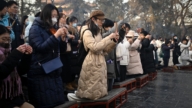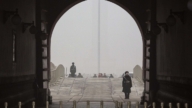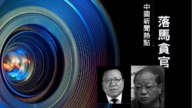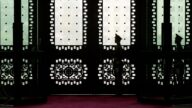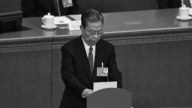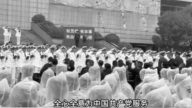【新唐人2013年02月26日訊】繼高舉「憲政夢」大旗後,日前,中共中央總書記習近平再次喊出所謂的要依法治國、依法執政、依法行政共同推進的口號。不過,有評論指出,習近平要真正落實依法二字,恐怕面臨著一個最大敵人。甚麼樣的敵人?一起去了解。
中共喉舌《新華社》報導,習近平2月23號在中共中央政治局集體學習時強調,要加強憲法和法律實施,形成法治環境,做到有法必依、執法必嚴、違法必究等。
在談到幹部選拔問題時,習近平說:「各級組織部門要把能不能依法辦事、遵守法律作為考察識別幹部的重要條件。」
習近平還強調,中共是執政黨,堅持依法執政,對全面推進所謂依法治國具有重大作用。
時事評論員林子旭認為,依法治國,首先立法和執法機構必須有獨立的權力,而中共開會談依法治國,而且還要在十八大精神、鄧、江、胡理論思想的指導下,推進立法、執法,是一件可笑的事情。林子旭試問﹕一個黨控制下的法律能公正嗎?
時事評論員林子旭:「會議裏面習近平強調說﹕各級黨組織必須堅持在憲法和法律範圍內活動,對這樣的話,很多中國人或許已經麻木了。如果我們把主人翁換一下,如果歐巴馬公開說美國民主黨必須堅持在憲法和法律範圍內活動,而且說各級美國政府要帶頭依法辦事,遵守法律,美國人聽了一定會笑掉大牙的。」
中國社會科學院世界歷史研究所馬龍閃:「制定法律方面,他是下了一些功夫,但是在怎麼樣執法的問題,把法律一一落實方面,還有很多工作要做。」
南京律師、東南大學法學院教授張讚寧指出,中共建政60多年來,法律也定了不少,口號也提了不少,但最終都成為紙上談兵。
張讚寧:「過去也是這樣提的。鄧小平還提過要使法律制度化、法律化,但是由於沒有堅持下去,沒有一個民主監督的機制,最後鄧小平自己就把他自己制定的法律都改變了。」
張讚寧指出,民主憲政是不可阻擋的世界潮流。如果中共做的跟講的背道而馳,就會引起暴力事件的不斷出現。他認為,中國要施行法治之國,首先要徹底批判毛澤東,把毛像從天安門拿下來,徹底根除這個「左派」。
但也有一部份輿論指出,憲法規定,公民有宗教信仰自由。要談所謂的法治,首先要解決中共系統性的對法輪功學員,以及其它信仰團體的非法批捕、判刑,以及非法迫害。
另外,根據憲法規定,中國公民有言論自由。因此,也有觀點認為,要談依法治國,首先應按照憲法去實施,不要再讓那麼多熱愛中國、談論民主憲政的無辜民眾因言獲罪。
林子旭:「中國普通的百姓每天活得都是戰戰兢兢、如履薄冰,真正無法無天的,不恰恰就是中共的黨員以及他們的兒孫嗎?比如說李天一。只要中共這個體制存在一天,中國就不可能建立起真正的法律體系,說白了,空談甚麼法治的中共,恰恰就是依法治國的最大障礙。」
今年新年伊始,《南方週末》新年獻詞中,原本強調習近平的憲法夢,卻遭廣東宣傳部長庹震刪改。1月7號,中共突然宣佈今年內取消勞教制度,同時習近平高調講話,再次強調他所提出來的憲法夢。
林子旭:「一個小小的劉雲山控制的中宣部就敢於和習近平公開叫板。誰給劉雲山壯的膽兒,說到底,還不就是支撐中共體制的這些個利益集團,因為真的把依法治國炒熱了,這些人的利益就要受到威脅,罪行就要被清算。」
因此,林子旭分析,不排除習近平有心想要推進法治,但是在中共體制下,根本就推行不下去。
採訪/常春 編輯/王子琦 後製/君卓
Xi Jinping Meets Major Obstacles in Calls for Rule of Law
After displaying his “constitutional dream,"
Xi Jinping,Secretary General of the Chinese
Communist Party (CCP), has released a slogan.
“Manage state affairs, politics and
administration by rule of law.”
Commentators say that Xi Jinping faces strong
opposition in implementing “rule of law.”
What or who is this opposition? We investigate.
According to the CCP controlled Xinhua News Agency,
Xi Jinping has stressed rule by law and constitution.
This was during a meeting of the CCP Political
Bureau of Central Committee on February 23.
He has required the formation of a legal environment, and
that laws be strictly enforced, with violators being prosecuted.
In discussing selection of officials, Xi Jinping said,
“Government departments at all levels should consider
an official’s ability to rule by law, during his evaluation.
Xi also emphasized that as the ruling party,
the CCP should adhere to “rule by law".
This is important for the legal administration of the country.
Political commentator Lin Zixu believes that rule of law first
requires independent legislative and law enforcement agencies.
When the CCP claims to implement rule of law, its
only under the guidance of CCP 18th Assembly.
It is also under the guiding ideology of “Deng,
Jiang & Hu,” which only ends up being a joke.
Lin Zixu questions whether there can be
rule of law under a single Party system?
Lin Zixu: “At the meeting, Xi Jinping stressed that all Party
organizations must abide by the Constitution and other laws.
Chinese people may have become indifferent to such cliches.
Imagine Obama publicly says that the U.S. Democratic
Party must abide by the law, and that the U.S. government
at all levels should take the lead in abiding by the law,
people will simply laugh themselves to tears.”
Ma Longshan, Institute of World History Study,
Chinese Academy of Social Sciences:
“[Xi Jinping] has made some efforts in establishing law,
but problems remain as to how to enforce such laws.”
Zhang Zanning, lawyer and law professor
at Southeast University, commented.
Although the CCP has enacted many laws
and introduced many slogans during its 60
years of rule, they all end up as empty talk.
Zhang Zanning: “The CCP has already said this in the past.
Deng Xiaoping mentioned that law should be
institutionalized, but he was unable to exercise it.
Because there is no democratic mechanism to enforce it,
finally Deng changed the laws that he enacted himself.
Zhang pointed out that constitutional democracy
is an irresistible trend in the world.
If what the CCP practices runs counter to its
slogans, that will incur increasing violent protests.
He believes that China must first thoroughly reject
Mao Zedong, if it is to implement rule of law.
Mao’s portrait must be removed from Tiananmen Square,
and the “leftist" ideoogy must be completely eradicated.
Some commentators also pointed out that the Constitution
dictates that citizens have the freedom of religious belief.
To talk about rule of law, the CCP must first
terminate its systemic and illegal arresting
and persecution of Falun Gong practitioners.
Chinese Constitution prescribes that
Chinese citizens have freedom of speech.
Some commentators say that to talk about rule
of law, the CCP must abide by the Constitution.
It should stop punishing innocent people simply
for talking about constitutional democracy.
Lin Zixu: “Ordinary Chinese people
live in fear and worry every day.
The truly lawless people are none other than
CCP officials and their family members,
such as Li Tianyi, son of Li Shuangjiang.
As long as the CCP exists, it is impossible
to establish a real legal system in China.
In other words, the CCP, which keeps talking about rule
of law, is precisely the biggest obstacle to the rule of law.”
At the beginning of the Chinese New Year,
“Southern Weekend” stressed Xi Jinping’s
“constitutional dream” in its foreword.
This was deleted by Guangdong
province propaganda chief Tuo Zhen.
On January 7, the CCP suddenly announced
that it was canceling its decades-long system
of re-education through labor within the year.
At the same time, Xi Jinping once again stressed
his “constitutional dream” in high-profile.
Lin Zixu: “The Central Propaganda Department
controlled by Liu Yunshan openly challenges this.
Who is behind Liu Yunshan? The answer is nothing
else but the interest groups supporting the CCP system.
If rule of law indeed becomes a heated public topic,
their interests will be threatened, and their crimes exposed.”
Therefore, Lin Zixu says he does not rule out the possibility
that Xi Jinping means to promote the rule of law, but under
CCP rule, this slogan can never see real implementation.




